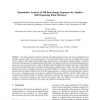29 search results - page 5 / 6 » A Minimum Relative Entropy Principle for Learning and Acting |
CORR
2011
Springer
13 years 2 months ago
2011
Springer
Modeling the behavior of imperfect agents from a small number of observations is a difficult, but important task. In the singleagent decision-theoretic setting, inverse optimal co...
GAMEON
2007
13 years 9 months ago
2007
An advanced Business Game is presented in the paper, built on the methodology of System Dynamics. It can be used for cognitive learning and knowledge transmission in schools and U...
ICML
2006
IEEE
14 years 8 months ago
2006
IEEE
There has been a recent, growing interest in classification and link prediction in structured domains. Methods such as conditional random fields and relational Markov networks sup...
CSB
2005
IEEE
14 years 1 months ago
2005
IEEE
Predicting and proper ranking of splice sites (SS) is a challenging problem in bioinformatics and machine learning communities. Proposed method of donor and acceptor SSs predictio...
VLSISP
1998
13 years 7 months ago
1998
This paper presents an adaptive structure self-organizing finite mixture network for quantification of magnetic resonance (MR) brain image sequences. We present justification fo...

